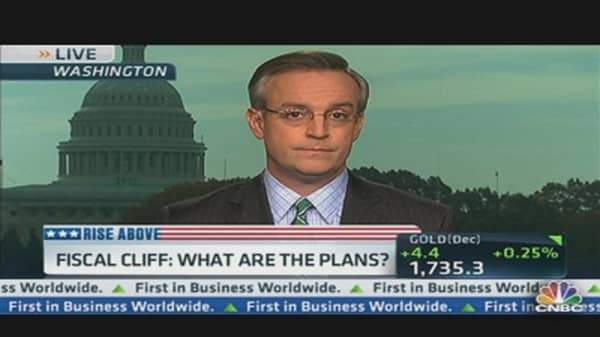The one thing we know for sure about the fiscal debate in Washington is that over the next year, someone's taxes are going to go up. But the fight will be over whose taxes and how much they will have to pay.
Already, Wall Street lobbyists in Washington are privately concluding that the so-called "carried interest" tax treatment that allows hedge fund managers and others to pay certain taxes at the lower capital gains tax rate will be "toast," in the words of one lobbyist.
And many think preferential tax treatment for capital gains and dividends is also set to go away as Washington scrambles for new revenue to stop the nation's fiscal bleeding. (Read More: Obama Looks to Rally Public Support for Fiscal Deal.)
On capital gains in particular, many of the reformers circulating plans in Washington are already advocating an elimination of the tax preference there.
Under the "illustrated plan" released by the Simpson-Bowles commission, capital gains and dividends would be taxed as ordinary income, with a top rate of 28 percent . A competing bipartisan plan, known as Domenici-Rivlin, would do the same. A Joint Committee on Taxation study floated a top rate as high as 38 percent for capital gains and dividends.
There are other proposals circulating on the tax side of the debate that will make some taxpayers angry. Simpson-Bowles, for example, would cap the mortgage interest deduction at $500,000 of home value for primary residences only. And it would phase out the employer sponsored health care tax exclusion. (Read More: 'Fiscal Cliff' Is a 'Grand Canyon': Bill Gross.)
Domenici-Rivlin would limit the mortgage interest deduction to just $25,000 worth of mortgage interest, and would repeal the deduction for state and local taxes.
A plan floated by the so-called "Gang of Six" of bipartisan senators would change tax deductibility rules in a wide range of areas, including health, charitable giving, homeownership and retirement. It would also repeal the AMT permanently—which will make some payers of that tax happy.
At this stage it's almost impossible to know where the final deal will land. But we can guess an amount that Washington might settle on. (Read More: What Is the 'Fiscal Cliff?')
In the so-called "Grand Bargain" negotiations between Speaker of the House John Boehner, R-Ohio, and President Barack Obama was heading toward about $800 billion in "new revenue" before negotiations broke off last year. ("Revenue" is Washington-speak for "taxes").
It's a safe bet that they'll end up somewhere in that range again this year with some sort of brokered deal before the new year that would delay the fiscal cliff and set the stage for broader tax reform legislation in 2013.
—By CNBC's Eamon Javers
@eamonjavers





